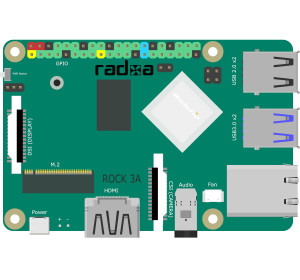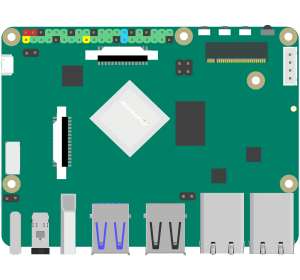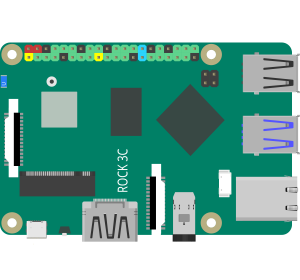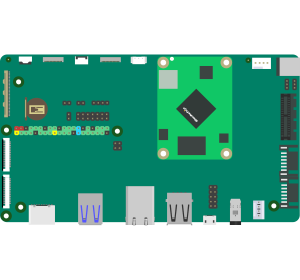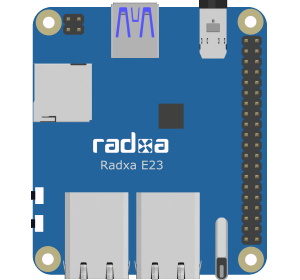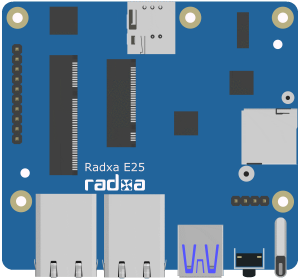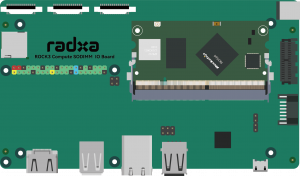|
|
| (23 intermediate revisions by 4 users not shown) |
| Line 2: |
Line 2: |
| | {{Languages|rock3/getting_started}} | | {{Languages|rock3/getting_started}} |
| | | | |
| | + | __NOTOC__ |
| | | | |
| − | __TOC__
| + | <div class="col-md-12"> |
| | + | <h3 class="brand-name text-center" style="margin-top:0px;"><span class="label flame">Getting started</span></h3> |
| | + | <hr class="tagline-divider" /> |
| | + | <h5 class="text-center" style="margin-bottom:20px;">Choose your ROCK 3 model to start</h5> |
| | + | </div> |
| | | | |
| − | __TOC__
| + | <div class="col-md-12 "> |
| | | | |
| − | This guide is designed for ROCK 3 enthusiast. The purpose is to learn about the ROCK 3 board as well as how to prepare and set up for basic use. The ROCK 3 has two models, one called ROCK 3 Model A and the other two called ROCK 3 Model B and Model C. When you get a board, you need to know what Pi model it is and which hardware version it is. The information is printed in the top side of the board. We will introduce the board information as much as possible.
| + | <div class="col-md-4"> |
| | + | <div class="panel panel-meadow"> |
| | + | <div class="panel-heading"> <h3 class="panel-title"><i class="fa fa-hand-o-up"></i> [[rock3/3a/getting_started | ROCK 3A]]</h3> </div> |
| | + | <div class="panel-body"> |
| | + | <div class="thumbnail ">[[File:Start_3a.png | 300px | link=rock3/3a/getting_started]]</div> |
| | + | </div> |
| | + | </div> |
| | + | </div> |
| | + | <div class="col-md-4"> |
| | + | <div class="panel panel-meadow"> |
| | + | <div class="panel-heading"> <h3 class="panel-title"><i class="fa fa-hand-o-up"></i> [[rock3/3b/getting_started | ROCK 3B]]</h3> </div> |
| | + | <div class="panel-body"> |
| | + | <div class="thumbnail ">[[File:Start_3b.png| 300px | link=rock3/3b/getting_started]]</div> |
| | + | </div> |
| | + | </div> |
| | + | </div> |
| | + | <div class="col-md-4"> |
| | + | <div class="panel panel-meadow"> |
| | + | <div class="panel-heading"> <h3 class="panel-title"><i class="fa fa-hand-o-up"></i> [[rock3/3c/getting_started | ROCK 3C]]</h3> </div> |
| | + | <div class="panel-body"> |
| | + | <div class="thumbnail ">[[File:Start_3c.png| 300px | link=rock3/3c/getting_started]]</div> |
| | + | </div> |
| | + | </div> |
| | + | </div> |
| | + | </div> |
| | | | |
| − | == What you need == | + | <div class="col-md-12"> |
| | + | <div class="col-md-4"> |
| | + | <div class="panel panel-meadow"> |
| | + | <div class="panel-heading"> <h3 class="panel-title"><i class="fa fa-hand-o-up"></i> [[Rock3/CM3/IO/getting_started | Radxa CM3 IO board]]</h3> </div> |
| | + | <div class="panel-body"> |
| | + | <div class="thumbnail ">[[File:Start_io.png| 300px | link=Rock3/CM3/IO/getting_started]]</div> |
| | + | </div> |
| | + | </div> |
| | + | </div> |
| | + | <div class="col-md-4"> |
| | + | <div class="panel panel-meadow"> |
| | + | <div class="panel-heading"> <h3 class="panel-title"><i class="fa fa-hand-o-up"></i> [[rock3/CM3/e23/getting_started | Radxa E23]]</h3> </div> |
| | + | <div class="panel-body"> |
| | + | <div class="thumbnail ">[[File:Start_e23.png| 300px | link=rock3/CM3/e23/getting_started]]</div> |
| | + | </div> |
| | + | </div> |
| | + | </div> |
| | + | </div> |
| | | | |
| − | === Necessary === | + | <div class="col-md-12"> |
| − | * ROCK 3 main board
| + | <div class="col-md-4"> |
| − | ** ROCK 3 Model A or Model B
| + | <div class="panel panel-meadow"> |
| | + | <div class="panel-heading"> <h3 class="panel-title"><i class="fa fa-hand-o-up"></i> [[rock3/CM3p/e25/getting_started | Radxa E25]]</h3> </div> |
| | + | <div class="panel-body"> |
| | + | <div class="thumbnail ">[[File:Start_e25.png| 300px | link=rock3/CM3p/e25/getting_started]]</div> |
| | + | </div> |
| | + | </div> |
| | + | </div> |
| | + | </div> |
| | | | |
| − | * One of the Storage media below:
| + | <div class="col-md-12"> |
| − | ** microSD, larger than 8GB.
| + | <div class="col-md-4"> |
| − | | + | <div class="panel panel-meadow"> |
| − | * Power supply]]
| + | <div class="panel-heading"> <h3 class="panel-title"><i class="fa fa-hand-o-up"></i> [[rock3/CM3S/IO/getting_started | Radxa CM3S IO board]]</h3> </div> |
| − | ** The ROCK 3 is powered by Type-C port and has a wide range of input voltage, from 9V to 21V. ROCK 3 supports USB Type-C PD 2.0 with 9V/2A, 12V/2A, 15V/2A and 20V/2A. Besides, the Pi supports QC 3.0/2.0 with 9V/2A and 12V/1.5A.
| + | <div class="panel-body"> |
| − | ** The Type-C cable you using needs to support data communication. We call it USB Type-C charging data cable.
| + | <div class="thumbnail ">[[File:Start_cm3sio.png| 300px | link=rock3/CM3S/IO/getting_started]]</div> |
| − | | + | </div> |
| − | * USB Keyboard and Mouse
| + | </div> |
| − | ** With four USB-A connectors, ROCK 3 can be equipped with a full sized keyboard and mouse.
| + | </div> |
| − | | + | </div> |
| − | * Monitor and HDMI Cable
| + | |
| − | ** ROCK 3 is equipped with a full sized HDMI connector. HDMI capable monitor is recommended.
| + | |
| − | ** HDMI EDID display data is used to determine the best display resolution. On monitors and TVs that support 1080p (or 4K) this resolution will be selected. If 1080p is not supported the next available resolution reported by EDID will be used. This selected mode will work with MOST but not all monitors/TVs.
| + | |
| − | | + | |
| − | *USB to TTL serial cable
| + | |
| − | **ROCK 3 exports a dedicated serial console for CPU, which can access the low level debug message.
| + | |
| − | | + | |
| − | *USB Male A to Male A cable
| + | |
| − | **If you want write image on ROCK 3 from USB OTG port or use fastboot/adb commands you need an USB Male A to Male A cable to connect ROCK 3 and PC.
| + | |
| − | | + | |
| − | === Optional ===
| + | |
| − | * microSD Card Reader
| + | |
| − | ** For flashing the image into microSD Card
| + | |
| − | | + | |
| − | * USB type A to type A cable
| + | |
| − | ** This is needed for fastboot/adb commands.
| + | |
| − | | + | |
| − | * USB to TTL serial cable
| + | |
| − | ** This is needed for serial console.
| + | |
| − | | + | |
| − | * Ethernet cable
| + | |
| − | ** ROCK Pi N10 supports Internet access via WIFI or Ethernet.
| + | |
| − | ** An Ethernet cable is used to connect your ROCK 3 to a local network and the Internet.
| + | |
| − | | + | |
| − | * Camera Module
| + | |
| − | ** ROCK 3 supports camera function.
| + | |
| − | | + | |
| − | * LCD Module
| + | |
| − | ** ROCK 3 supports LCD display function.
| + | |
| − | | + | |
| − | * Audio cable
| + | |
| − | ** Audio can be played through speaker or headphones using a standard 3.5mm jack.
| + | |
| − | | + | |
| − | == Close look of ROCK 3 ==
| + | |
| − | * ROCK 3 front view
| + | |
| − | * ROCK 3 front with an angle view
| + | |
| − | * ROCK 3 back view
| + | |
| − | | + | |
| − | | + | |
| − | == <span id="get_start_specs"></span> Features ==
| + | |
| − | | + | |
| − | {| class="wikitable"
| + | |
| − | ! Model
| + | |
| − | ! colspan="1" width=30% | ROCK PI N10 Model A
| + | |
| − | ! colspan="1" width=30% | ROCK PI N10 Model B
| + | |
| − | ! colspan="1" width=30% | ROCK PI N10 Model C
| + | |
| − | |-
| + | |
| − | !SoC<br><br>CPU<br>GPU<br>NPU
| + | |
| − | | colspan="3" | '''RK3399Pro''' <br><br>Dual Cortex-A72, freqency 1.8Ghz with quad Cortex-A53, frequency 1.4Ghz<br>
| + | |
| − | Mali T860MP4, OpenGL ES 1.1 /2.0 /3.0 /3.1 /3.2, Vulkan 1.0, Open CL 1.1 1.2, DX11<br>
| + | |
| − | Support 8bit/16bit computing, up to 3.0TOPs computing power
| + | |
| − | |-
| + | |
| − | ! Memory
| + | |
| − | | colspan="1" | LPDDR3<br />4GB 64bit dual channel LPDDR3@1866Mb/s, 3GB for CPU/GPU, 1GB for NPU
| + | |
| − | | colspan="1" | LPDDR3<br />6GB 64bit dual channel LPDDR3@1866Mb/s, 4GB for CPU/GPU, 2GB for NPU | + | |
| − | | colspan="1" | LPDDR3<br />8GB 64bit dual channel LPDDR3@1866Mb/s, 4GB for CPU/GPU, 4GB for NPU
| + | |
| − | |-
| + | |
| − | ! Storage
| + | |
| − | | colspan="1" | on board high performance eMMC 16GB
| + | |
| − | | colspan="1" | on board high performance eMMC 32GB
| + | |
| − | | colspan="1" | on board high performance eMMC 64GB
| + | |
| − | |-
| + | |
| − | ! Storage
| + | |
| − | | colspan="3" | 4MB SPI flash <br>μSD card (μSD slot supports up to 128 GB μSD card)<br />M.2 SSD (M.2 connector supports up to 8TB M2 NVME SSD)
| + | |
| − | |-
| + | |
| − | ! Display
| + | |
| − | | colspan="3" | HDMI 2.0 up to 4k*2k@60<br />MIPI DSI 2 lanes via FPC connector<br />4 lanes eDP 1.3, up to 4K*2K@60<br>Any two of HDMI, MIPI DSI and eDP can work at the same time, support mirror mode or extend mode.
| + | |
| − | |- | + | |
| − | ! Audio
| + | |
| − | | colspan="3" | 3.5mm jack with mic<br />HD codec that supports up to 24-bit/96KHz audio. | + | |
| − | |-
| + | |
| − | ! Camera
| + | |
| − | | colspan="3" | MIPI CSI 2 lanes via FPC connector, support up to 800 MP camera.
| + | |
| − | |-
| + | |
| − | ! Wireless
| + | |
| − | | colspan="3" | None. Optional [[ROCKPI_wireless_module | ROCK Pi Wireless Module]]
| + | |
| − | |-
| + | |
| − | ! USB
| + | |
| − | | colspan="3" | USB 3.0 OTG X1, hardware switch for host/device switch, front one<br />USB 2.0 HOST X2
| + | |
| − | |-
| + | |
| − | ! Ethernet
| + | |
| − | | colspan="3" | GbE LAN with Power over Ethernet (PoE) support<br />additional HAT is required for powering from PoE
| + | |
| − | |-
| + | |
| − | ! IO
| + | |
| − | | colspan="3" | 40-pin expansion header<br />2 x UART<br />2 x SPI bus<br />3 x I2C bus<br />1 x PCM/I2S<br />1 x SPDIF<br />2 x PWM<br />1 x ADC<br />6 x GPIO<br />2 x 5V DC power in<br />2 x 3.3V DC power in
| + | |
| − | |-
| + | |
| − | ! Others
| + | |
| − | | colspan="3" | RTC<br />RTC battery connector for time backup(optional) <br>KEY<br>Maskrom key, reset key <br>IR<br> IR Receiver
| + | |
| − | |-
| + | |
| − | ! Power
| + | |
| − | | colspan="3" | USB PD, support USB Type C PD 2.0, 9V/2A, 12V/2A, 15V/2A, 20V/2A.<br />Qualcomm® Quick ChargeTM: Supports QC 3.0/2.0 adapter, 9V/2A, 12V/1.5A
| + | |
| − | |-
| + | |
| − | ! Size
| + | |
| − | | colspan="3" | 100mm x 100mm
| + | |
| − | |}
| + | |
| − | | + | |
| − | __TOC__
| + | |

